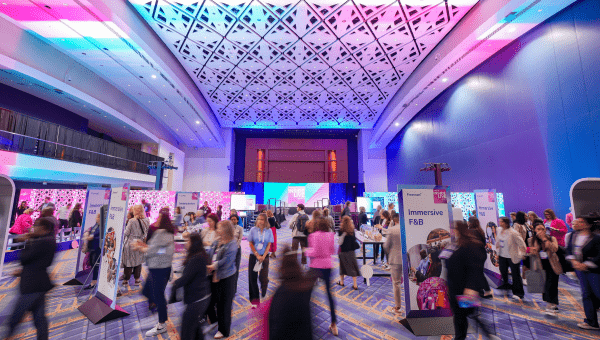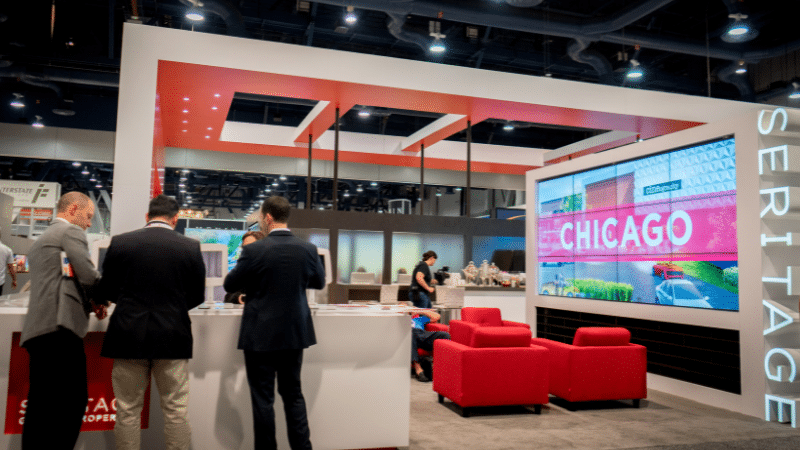Driving growth with hybrid events
At a Glance
How hybrid events can extend the conference beyond a convention center
Ways these physical + virtual gatherings can transform your marketing strategy
Why hybrid offerings can provide more comprehensive data points
We’re already seeing in-person and hybrid events happening successfully, but obviously the environment, literally and figuratively, is much different than in pre-COVID times. Even though the return is starting, there will still be people who would love to engage with your brand at an event, but simply cannot attend.
So, if show organizers and event marketers hope to expand their event and their brand to new audiences in the future of live, they must expand and evolve their reach to connect with these people.
What is a hybrid event?
Hybrid events include a live on-site presence and a live virtual presence, which combines the best elements of environments. This merging of experiences allows audiences opportunities to participate, learn, and engage no matter where they are.
Here’s an example of how a hybrid event would work:
An industry conference could utilize a virtual event platform to create an omnichannel, immersive digital experience for distributing live broadcasts and on-demand content. Whether it’s the keynotes, webinars, individual educational sessions, testing, assignments or more, the hybrid event would extend the conference beyond the convention center, making it easy for industry professionals worldwide to engage both during the event, and long after it.
In the words of the old Bell advertisement, it’s “the next best thing to being there.”
Does offering online access to your event content carry a risk of people choosing to stay home instead of attending in person? It may happen in a handful of cases, but it’s unlikely to make a significant dent in your in-person attendance. Instead, it opens up the doors to major event growth. People who couldn’t attend before can now enjoy access to reams of exciting and helpful content, often enticing them to consider attending in person. Offering attendees options is going to be more important than ever, and hybrid events will become an important component of an integrated event experience strategy.
“Hybrid events offer a unique opportunity to easily and seamlessly reach audiences around the world and, at all times of the year, encourage them to engage with the event and its content as well as join the event’s community.”
For a typical event, the marketing strategy revolves around one task: Getting attendees to register and travel to the event.
Hybrid events have the potential to transform an organization’s event marketing strategy, opening up new possibilities and options: With geography no longer an impediment, the strategy can target regions it may not have approached before, greatly expanding the event audience.
- Attendees who cancel their registration or who are no-shows can be targeted with offers to take advantage of the online options, keeping them interested and engaged.
- The online event and its resources can be marketed all year long, offering show organizers and event marketers the chance to capitalize on timely opportunities.
- Popular content, whether live or on-demand, can provide lucrative sponsorship opportunities and can be promoted throughout the year.
- Opening up the lines of communication with virtual attendees can provide valuable insights on what type of content would make them want to attend in person, giving event marketers and show organizers extra fuel for event growth.
- Tracking participation and assessing effectiveness becomes much simpler, letting content managers more easily assess the effectiveness of their content.
Along with massive audience growth and engagement comes an equally large expansion of available event data.
How do hybrid events improve event data?
Because hybrid events offer a virtual component, show organizers and event marketers can collect data points based on the online audiences’ participation. For example:
- An association is hosting an industry conference and wants to improve the educational sessions and material it offers. However, the survey data collected so far doesn’t provide enough clear direction for improvement. The association works with a virtual event platform, which not only hosts the virtual component of the in-person event but provides year-round access to the session content with a learning management system (LMS), allowing members worldwide to work toward accreditation by viewing the content online. Because the virtual audience can be so much larger than the in-person one, analyzing participation data can provide conclusive insights that help the association refine their content for future events.
- A company is doing a product launch event and wants greater insights about exactly who its market is. Those who can’t attend in person can visit a landing page, complete a form, and watch a livestream of the product launch. Not only does this greatly expand the overall event audience, it also provides a larger and more comprehensive set of data, allowing for better demographic conclusions.
“When combined with the right technology, hybrid events can provide you with deep insight on the pain points, knowledge gaps, and opinions of the people you most want to reach.”
Collecting the data
During a typical conference session, you might get a handful of people asking questions once the presentation is complete.
Is anybody taking note of these questions and the discussion that follows? Probably not.
That’s lost data.
Audience engagement platforms bring the in-person and virtual attendees together, interacting with the content, asking questions, answering polls, making comments, and posting on social media. This data is priceless for presenters, show organizers, and event marketers.
What questions were asked? What were the poll results? Were some polls answered more readily than others, indicating peaks and troughs of audience interest? Was there a drop in virtual attendance at any point or did people stay for the entire session?
Collecting data points from this significantly expanded audience gives you the raw material for deep insights that can transform your event strategy.
Integrating and using the data
But what of this raw data? It’s great to know what questions were asked during Jane Smith’s session, but what does that tell you?
Fortunately, an event tech integration platform allows data from all of your applications, from registration to your interactive platforms to the stats on your landing pages, to be pulled together and coalesced into one master dataset. And then, a data analytics dashboard can aggregate your data and create actionable reports that give you the complete story on your hybrid event performance.
Hybrid events offer event marketers and show organizers an unprecedented opportunity to vastly expand audiences and transform their in-person events into a formidable integrated engagement vehicle. By implementing virtual elements as a part of your event and creating opportunities for worldwide audiences to consume your event content year-round, you can grow your attendance, optimize your event strategy, and gain powerful insights to continually improve your event.
Looking for a virtual event partner?
Our experts can help!


